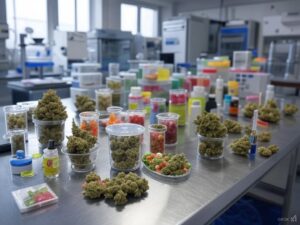Welcome to the blog of George Creal, your Georgia DUI lawyer. Today, we delve into a complex but crucial topic in the realm of DUI defense: the nuances of cannabinoid or Marijuana related testing with an emphasis on the differences between GC-MS and LC-MS/MS methods, and how Georgia law mandates a specific approach to marijuana-related charges. Please note, while I am not a toxicologist, I aim to provide an understanding of these issues based on available scientific insights.
Understanding GC-MS in Cannabinoid Analysis
Gas Chromatography-Mass Spectrometry (GC-MS) has been a traditional method for analyzing cannabinoids, including Delta-9 THC, which is the psychoactive component of cannabis. However, there are significant limitations when using GC-MS for this purpose:
Thermal Decarboxylation: One major issue with GC-MS is the necessity to heat the sample. This
Indistinct Identification: GC-MS, along with LC-MS (Liquid Chromatography-Mass Spectrometry), struggles with distinguishing between Delta-8 THC and Delta-9 THC due to their nearly identical fragmentation patterns. Without additional chemical processes like derivatization or a different analytical approach, these tests might not confirm whether the THC detected is specifically Delta-9.
The Superiority of LC-MS/MS for Accurate Analysis
Liquid Chromatography-Tandem Mass Spectrometry (LC-MS/MS) emerges as a more reliable method for cannabinoid testing, particularly due to:
No Thermal Conversion: Unlike GC-MS, LC-MS/MS does not require heating the sample. This preserves the integrity of the compounds being tested, preventing the conversion of THCA to Delta-9 THC.
Enhanced Differentiation: LC-MS/MS uses a technique known as Multiple Reaction Monitoring (MRM), which allows for the differentiation between Delta-8 THC and Delta-9 THC. This is achieved by analyzing both the precursor ion (the original molecule) and its product ions (the fragments it breaks into). This dual analysis provides a clearer distinction between these structurally similar compounds.
Specificity and Sensitivity: The tandem mass spectrometry aspect of LC-MS/MS (the second MS) adds another layer of analysis not present in single-stage mass spectrometry. This second stage can differentiate compounds based on their fragmentation patterns, which is critical when the initial mass-to-charge ratio alone cannot distinguish between Delta-8 and Delta-9 THC.
Implications for DUI Defense in Georgia
Understanding these testing methodologies is vital in DUI cases where cannabinoid levels are in question:
Challenging Evidence: If your case involves GC-MS results, arguing the potential for THCA conversion to Delta-9 THC during testing could be a defense strategy.
Requesting Retesting: You might advocate for retesting with LC-MS/MS to ensure accuracy, especially if there's any doubt about the compound's identity or concentration.
Expert Testimony: Bringing in a toxicologist who can explain these nuances to a judge or jury can be pivotal, particularly in highlighting the limitations of the testing methods used by law enforcement or prosecutors.
Georgia Law and Daubert Motions
Under Georgia law, a Daubert motion is mandatory for a comprehensive defense in cases involving marijuana-related charges and testing, specifically under the framework of OCGA § 24-7-702. This law requires that expert testimony must be based on reliable principles and methods, ensuring that the scientific evidence presented in court is both relevant and reliable. In the context of DUI for marijuana or THC or Marijaua related charge:
Daubert Hearing: A Daubert hearing allows defense attorneys to challenge the admissibility of scientific evidence, including the methodologies used in drug testing. Here, we can delve into whether the testing methods like GC-MS or LC-MS/MS meet the stringent reliability standards set by Daubert.
Challenge the Methodology: This motion provides an opportunity to scrutinize the forensic science behind the testing, questioning the science's validity, reliability, and relevance to the specific case at hand.
Expert Witnesses: Utilizing experts who understand the science behind these tests can help in educating the court on the potential for misinterpretation or misidentification of cannabinoids, leveraging the complexities of THC analysis to your advantage.
While this post provides an overview, the field of forensic toxicology is constantly evolving and nuanced. If you or someone you know is facing DUI or Drug charges involving cannabis in Georgia, understanding the science behind the evidence is crucial. At the law office of George Creal, we stay informed to provide the best defense possible, including navigating the legal requirements for Daubert motions.
Remember, every case is unique, and the specifics of your situation should be discussed with a qualified attorney. If you need assistance with your case, don't hesitate to contact us for a consultation.
Stay informed and stay safe on the roads of Georgia.
-George Creal, Georgia DUI Lawyer
Contact Us Today
For a free consultation, contact the Law Offices of George Creal today on the web at www.georgecreal.com or on the phone at (404) 333-0706. We are here to help you navigate the legal system and fight for your rights.
Disclaimer
The information in this blog post is for general informational purposes only and should not be construed as legal advice. Please consult with an attorney to discuss your specific legal situation.

